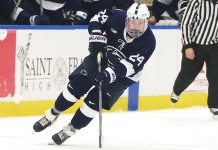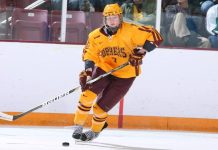The proposed overhaul of NCAA eligibility standards takes another step toward fruition this month when the Academics/Eligibility/Compliance Cabinet meets to tweak the proposal that will eventually go to the school presidents. That final vote is currently scheduled for April.
While the national media continues to virtually ignore the issue, it has become a hot-button topic in college hockey circles, and for good reason.
After a two-year study, the sub-committee on Amateurism and Agents forwarded legislation last September that, if passed, completely changes the landscape of NCAA eligibility standards. Whereas playing in a pro league, taking money and signing endorsement deals were once taboo, the new rules would eliminate all of those issues.
Instead, you would be allowed, after high school graduation, to play anywhere you want and still have eligibility remaining, with the stipulation that for each year you played in a competitive league, you would lose one year of NCAA eligibility.
Initially, the legislation included a one-year grace period following high school graduation. However, basketball people objected to that, fearful that it would lead to the formation of super leagues. So the sub-committee will propose the elimination of the one-year grace period at its February 15-17 cabinet meeting in Tampa Bay, Fla.
But with minimal impact on the major sports, the major media ignores the story. Meanwhile, love it or hate it, hockey people agree that the impact on hockey will be enormous.
Many like the new legislation, because it addresses the long-standing issue of the eligibility of Major Junior players. Players who go to Canadian Major Juniors, some as early as age 16, are currently ineligible for the NCAA.
But the elimination of the grace period exacerbates a potentially devastating problem for U.S. amateur leagues. Places like the USHL, the premier junior league in the United States, pride themselves on taking 18- and 19-year-olds and getting them better prepared for college hockey. Now, for each year played past high school graduation, those players would lose a year of NCAA eligibility, meaning they probably wouldn’t stay in the USHL, or go there in the first place.
The sub-committee heard the immediate outcry from the hockey community, but didn’t act on it because they said there were too many voices with differing opinions. That changed at the January NCAA Convention in San Diego, when a group of hockey people led by WCHA Commissioner Bruce McLeod and USHL Commissioner Gino Gasparini, went to voice their concerns.
“They were extremely productive conversations,” said Lisa Dehon, chair of the sub-committee. “We asked them to put together some specific concerns and specific solutions they think would help. Then we’ll take a look. If needed, we could then meet in person meeting before our February cabinet meeting.”
Dehon says there is still some fragmentation within the hockey community, but that they are much closer to coming together on the issue.
“They have very legitimate concerns and they have been able to demonstrate those,” Dehon said. “We still see a little (fragmentation of opinion), but we’ve narrowed the focus to one particular part (of the legislation). So we’ve gained by leaps and bounds.”
The commissioners of the hockey conferences — McLeod, Phil Buttafuoco (ECAC), Joe Bertagna (HEA), Tom Anastos (CCHA) and Rich Ensor (MAAC) — were scheduled to have a conference call this week, where they hoped to hammer out specific legislation that would address the issue. They hope to come up with something that fixes what’s wrong, but doesn’t change what’s already working.
The sub-committee agrees that hockey has unique recruiting issues, and is ready to work with the sport’s leaders.
“Hockey is unique, there’s no way around it,” Dehon said. “We certainly don’t want to have negative impacts. We would like to see them propose something, and we’ll work with them.”
One thing the sub-committee has to be careful of, however, is making too many sport-specific changes to what’s supposed to be sweeping reforms.
“It doesn’t make sense to alter the legislation for scenarios we don’t know will come true,” Dehon said. “But hockey has been able to generate statistics on where hockey players come from, and we can see the impact.”
The direction of any amendments to the legislation should be known after the Cabinet meeting in mid-February.


